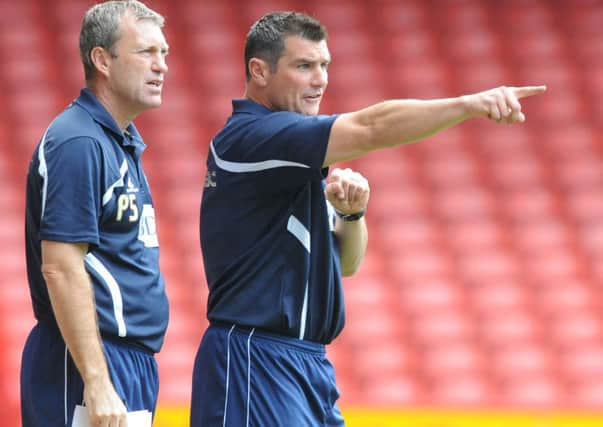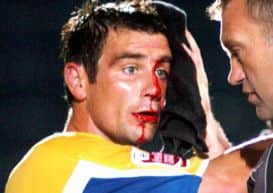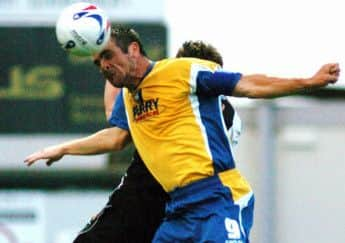Stags favourite Barker is ‘managing’ just fine


Some footballers are born to manage - and former Stags striker Richie Barker is certainly one who falls into that category.
When the former Mansfield Town target man was forced to retire from playing because of a knee injury there was never any doubt what he was going to do next.
Advertisement
Hide AdAdvertisement
Hide AdIndeed, Barker had one eye on his post-playing career from the age of 23 when he started his initial FIFA coaching qualifications that he says he had already completed prior to his arrival at Field Mill in 2004.


From then on, the now 38-year-old has always been destined for the managerial ladder - and he wasted little time in grasping tightly to those all-important first rungs.
After gaining experience coaching junior and youth teams, he took charge at Bury after a hugely successful spell as caretaker boss and later moved on to League One Crawley Town before being unveiled as the new boss at League Two sleeping giants Portsmouth today (Monday).
In the end, the transition from pitch to dug-out has been relatively seamless. Well, at least as smooth as it can be in the sometimes chaotic world of Football League management.
Advertisement
Hide AdAdvertisement
Hide Ad“The decision on when I turned to coaching was made for me by a surgeon who told me that was it with my knee, but I had been ready for that moment for a long time,” explained Barker.


“Even when I was still playing I was spending some of my spare time taking Sheffield United under-15s just to get my foot in the door and a feel for it.
“Of course it was tough being told you had to retire - I wanted to retire when I wanted to do it. But at least I was 34 not 24 and I’d enjoyed 16 years in the game, so I took the positives.
“After Sheffield United I then had two years coaching youth team football at Scunthorpe and Bury and after that I got my chance with Bury.
Advertisement
Hide AdAdvertisement
Hide Ad“Some players have a feel for coaching from very early on and others make the decision to go into it later. I definitely fell into the first of those categories.
“When you start, you can either work your way through the leagues, as Paul Cox has done at Mansfield, or like, me, work your way up through the levels within clubs.
“I think it helped that before becoming a footballer I wanted to be a teacher and that probably helped me in that I could transfer that passing on of skills and knowledge from one environment to another.”
Barker’s chance to take his first hot seat came at Gigg Lane following the departure of Alan Knill, who left to take over at Scunthorpe United with just eight games left to go of the 2010-11 season.
Advertisement
Hide AdAdvertisement
Hide AdIt was quite some introduction as just a month later, the Sheffielder had the first promotion on his CV after leading Bury from fourth place up to second as the Shakers went up automatically.
He said: “Being a caretaker boss was the best learning curve I could have as a manager. It was almost like a try before you buy scenario for me.
“It could have gone the other way for me, but fortunately I won my first six games in charge, we won promotion and I was up and running.
“My biggest success there was to resist the temptation to change it and put my own stamp on it. Sometimes you have to recognise that things are not broken and keep them going the way they were.
Advertisement
Hide AdAdvertisement
Hide AdHaving established Bury in League One, Barker’s ambition meant he was tempted by Crawley’s offer to take over the reins from Steve Evans and, briefly, Sean O’Driscoll at the Broadfield Stadium, now called the Checkatrade.com Stadium.
It was not a decision he took lightly - and it found him trying to compete as a small fish among much bigger cousins such as Wolves, Sheffield United, Bristol City and Preston.
“Crawley have made their way up through the pyramid and had back to back promotions to get out of the Conference and into League One and at times the fans have had to pinch themselves,” said Barker.
“But the budget was never going to be sustainable as it was, and one of the first things I had to do when I came in was reduce it.
Advertisement
Hide AdAdvertisement
Hide Ad“That made it extremely tough when you see some of the clubs you’re up against, and we probably had one of the smallest squads in the Football League with 19 professionals.
“But it was a challenge I enjoyed and if the club can go on to finish mid-table this season,as was my aim while I was there, then I think it will be a job well done.”
Don’t forget to log on tomorrow to read the second part of Barker’s interview, which includes memories of his time at Mansfield.